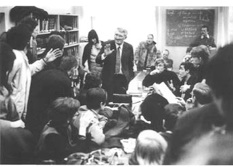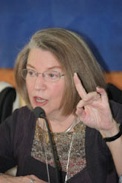Critical social theory, theories of recognition, discourse ethics (Habermas, Honneth, and more)
last updated August 18, 2013
“Critical theory” means different things to different people. I take it to mean the tradition of social philosophy, philosophical anthropology, and political theory that traces its roots back to the Frankfurt School. I’ve provided one overview of this tradition, focused on the position of Axel Honneth within it,
Ultimately, however, I am less interested in the historical roots of Critical Theory than in the contemporary developments of it, for example in the work of Nancy Fraser, Axel Honneth, Michel Foucault, Charles Taylor, and Jürgen Habermas. In addition, I’m also interested in the overall philosophical system of these thinkers, especially in the case of Habermas.
Below you will find publications of mine related to:
Jürgen Habermas & Axel Honneth & Topics in critical social theory



Work related to Jürgen Habermas
“Autonomy, Agency, and the Self,” in Barbara Fultner (ed.), Habermas: Key Concepts (Durham: Acumen Press, 90-111).
Free Will as Part of Nature: Habermas and His Critics, special issue of Philosophical Explorations 10:1 (March 2007). (Includes a new essay by Jürgen Habermas and commentaries by John Searle, Timothy Schroeder, Randolph Clarke, and Michael Quante, as well as a reply by Habermas.)
-
•My translation of Jürgen Habermas, “The Language Game of Responsible Agency and the Problem of Free Will: How Can Epistemic Dualism Be Reconciled with Ontological Monism?
-
•“Introduction: Free will, neuroscience, and the participant perspective"
“Vrijheid door betrokkenheid: Strawson en Habermas tegen vrije-wil scepticisme” [“Freedom Through Engagement: Strawson and Habermas versus Free-Will Skepticism”] in Maureen Sie (ed.), Hoezo Vrije Wil? (Rotterdam: Lemniscaat, 2011) (English version available upon request.)
“Competent Need-Interpretation and Discourse Ethics,” in Pluralism and the Pragmatic Turn: The Transformation of Critical Theory, ed. James Bohman and Bill Rehg (Cambridge, Mass: MIT Press, 2001), 193-224. Also available: scanned copy of the published chapter (3.4MB)
“Review of Jürgen Habermas, The Future of Human Nature,” Ethics 115 (2005): 816-21.
Work related to Axel Honneth
“Translator’s Introduction” to Axel Honneth, The Struggle for Recognition: The Moral Grammar of Social Conflicts (Cambridge, Mass: Blackwell, 1995), x-xxi.
Anderson, Joel. “Autonomielücken als soziale Pathologie. Ideologiekritik jenseits des Paternalismus,” [Autonomy Gaps as Social Pathology: Ideologiekritik without Paternalism,”], in Rainer Forst, Martin Hartmann, Rahel Jaeggi, und Martin Saar (eds.) Sozialphilosophie und Kritik (Frankfurt: Suhrkamp, 2009), 433-453.
“Situating Axel Honneth in the Frankfurt School Tradition,” in The Critical Theory of Axel Honneth, ed. Danielle Petherbridge (Leiden: Brill, forthcoming)
-
•[See also the earlier discussion: “The ‘Third Generation’ of the Frankfurt School,” Intellectual History Newsletter 22 (2000): 49-61.
“Autonomy, Vulnerability, Recognition, and Justice” (co-authored with Axel Honneth) in John Christman and Joel Anderson (eds.), Autonomy and the Challenges to Liberalism: New Essays, (New York: Cambridge University Press, 2005), 127-49.
Translation of Axel Honneth, “Grounding Recognition: A Rejoinder to Critical Questions,” Inquiry 45 (2002): 499-519.
Translation of Axel Honneth, The Struggle for Recognition: The Moral Grammar of Social Conflicts (Cambridge: Polity Press, 1995; paperback, Cambridge, Mass., The MIT Press, 1996).
Work related to Critical Social Theory
“Intercultural Dialogue and Free, Full and Equal Participation: Towards a New Agenda for an Intercultural Europe,” in Platform for Intercultural Europe (ed.), Intercultural Europe: Enabling free, full and equal participation (London: Alliance Publishing, 2010), 4-35.
“Die gerechtigkeitsorientierte Familie: Jenseits der Spannung zwischen Liebe und Gerechtigkeit” (with Pauline Kleingeld), in Axel Honneth and Beate Rössler (eds.), Von Person zu Person: Zur Moralität persönlicher Beziehungen (Frankfurt: Suhrkamp, 2008), 283-312.
-
•Working English version: "Justice as a Family Value" (with Pauline Kleingeld), available upon request.
“Hegel’s Implicit View on How to Solve the Problem of Poverty: The Responsible Consumer and the Return of the Ethical to Civil Society,” in Beyond Liberalism and Communitarianism: Essays on Hegel’s “Philosophy of Right”, ed. Robert Williams (Albany, NY: SUNY, 2001), 185-205.
“Is Equality Tearing the Family Apart?” in Applied Ethics: A Multicultural Approach, 2nd ed., ed. Larry May, Shari Collins-Chobanian, and Kai Wong (Upper Saddle River, NJ: Prentice-Hall, 1997), 362-72.
“‘Special Interests’ and the Common Good: The Construction of an Opposition,” in A Cultural Lexicon: Words in the Social (CIRA Working Papers Series No. 2), ed. D. Moore, K. Olson, J. Stoeckler (Evanston: Center for Interdisciplinary Research in the Arts, 1991), 91-102.